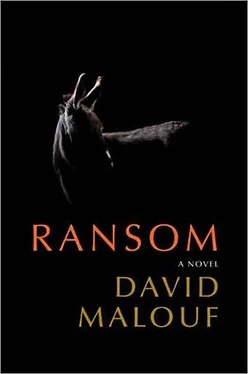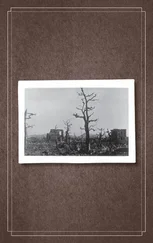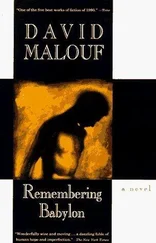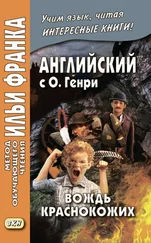Achilles watched. Himself like a dead man. Feeling nothing.
When they were done and had stepped away, he roused himself and approached the body. Stood staring down at it. Then, taking a knife from his belt, he fell to one knee, and swiftly, as if he had always known that this was what he would do, slashed one after the other from ankle to heel the tendons of Hector’s feet.
His men looked on. They could not imagine what he was up to.
Unwinding from his waist an oxhide thong, he lifted the feet and lashed them together; then, with the thong wound tight around his wrist, dragged the corpse to his chariot. Passing the thong once, twice, three times round the beechwood axlebar, he made it fast to the car. Jerked the hide to see that it would hold. Then, like a man obeying the needs of some other, darker agency, he leapt onto the platform, dashed the stinging sweat-drops from his eyes, touched the horses lightly with the traces and wheeled out onto the plain, half-turning from time to time to observe how the body, its head and shoulders bouncing over the dry uneven ground, swung in a wide arc behind him.
They were moving slowly as yet. The horses, excited by his presence and the promise of exercise, jerked their heads.
Leaning forward, he whispered to them, dark syllables of horse magic, then loosed the reins.
Behind him the body, its locks already grey with dust, leapt and followed, the hip-bones and the shoulderblades of the massive back dashing hard against sharp-edged flinty stones and ridges as, time after time with gathering speed, the wheels of the light car took to the air, then struck down hard again in a shower of sparks. Faster and faster he drove, up and down under the walls of Troy, his hair loose and flying, gouts of sweat flung from his brow, as Hector’s corpse, raw now from head to foot and caked with dust, bounded and tumbled, and Priam, Hector’s father, and his mother Hecuba, and his wife Andromache with the child Astyanax at her hip, and Hector’s brothers and brothers-in-law and their wives, and all the common people of Troy, who had flocked to every vantage point on the walls, looked on.
Still he felt nothing. Only the tautness of the muscles in his forearm where all the veins were puffed and thickened, and in his toes where they gripped the platform of the car. Only the humming of the air, and its scorching touch as it eddied round and past him.
He was waiting for the rage to fill him that would be equal at last to the outrage he was committing. That would assuage his grief, and be so convincing to the witnesses of this barbaric spectacle that he too might believe there was a living man at the centre of it, and that man himself.
In full sunlight now, face taut and wind-chopped, the skin over his cheekbones stiff with salt, salt on his dry lips when he wets them, Achilles comes to the outskirts of the camp.
All is activity here, the day has begun. From off in the distance a lowing of cattle, a bleating of sheep crowded close in their pens. In the stillness somewhere, the knock of an axe.
But the sun has not yet reached the encampment.
A powdering of frost whitens the base of the pine-trunks that make up the high stockade wall. Small fires are burning, most of them no more now than embers, sending up thin trails of smoke. The guards who crouch beside them, or stride up and down flapping their arms in the morning chill, are wakeful but sleepy-eyed at the end of their watch.
They are men from his home country, clear-spirited and secure in their animal nature, unacquainted with second thoughts. Their sinewy limbs and hard-bitten features, like his own, come from tramping the craggy uplands that in summer, when hawks hang on updraughts over the granite peaks, are ablaze with a compacted heat that invests the whole upper air with its fiery intensity, and in winter become tracts of ice. Their fathers are smallholders who raise wheat in the deep soil of the flatlands and grow small sweet grapes on the ridges above; keep herds of long-horned cattle, and sheep whose milk goes into the curds their women make. On their tongues, as on his, the harsh north-country dialect, full of insults that are also backhanded terms of affection. Its wry jokes and weather-rhymes are the proof in their mouths of a link between them that is older than the oaths of loyalty they swear.
They have the minds of hawks, these men, of foxes and of the wolves that come at night to the snowy folds and are tracked and hunted. They love him. He has long since won their love. It is unconditional.
But when they look at him these days, what they see confounds them. They no longer know what authority they are under. He is their leader, but he breaks daily every rule they have been taught to live by. Their only explanation is that he is mad. That some rough-haired god has darkened his mind and moves now like an opposing stranger in him, occupying the place where reason and rule should be, and sleep, and honour of other men and the gods.
He makes his way past them, and on to where his horses are kept, and the fast light chariot where Patroclus once stood beside him is housed in its shed. He calls up his grooms. Orders them, as he has each morning now for eleven days, to lead out his horses, wheel out his chariot and make all ready for use.
The men obey, but they know what he has in mind and cannot bear to meet his eye.
He watches them work, striding impatiently up and down the yard. On the lookout for some fault he may find with them. Inwardly raging.
But they know how he is these mornings and take care. When the horses come trotting out they are combed and glossy, the spokes and felloes of the chariot wheels have been sponged clean, the rails of the car freshly burnished. They have done their work well. He is punctilious, but so are they. Let him rage as he will and do his looking.
They smile at one another, but show nothing when, after walking twice around the car and stopping half a dozen times to scrutinise their work, he nods and turns to the horses.
These horses were a gift from the gods at his parents’ wedding. Balius and Xanthus, they are called. He whispers a word or two in their ear that the grooms do not catch, and they lift their heads, shake their oiled manes, their dark coats rippling. Though they have a divine spark and are immortal, they are also creatures like any other, and so sensitive in their animal nature, so responsive to every shift of their master’s thought, that they seem endowed with a reason and sympathy that is almost human.
Xanthus, the more nervous, the more impulsive of the two, is Achilles’ favourite. He lays his hand now, very gently, on the satiny hide; senses the lightning quiver of muscle under the almost transparent skin. Leaning close to the leathery soft lip, and feeling warm breath on his cheek, he experiences a rush of tenderness that might be for himself; of awe too at the other life of this magic being; and when he observes the eyes of the grooms upon him with their question — What’s he up to now? — a kind of envy for how free the creature is of a self-consciousness that at times makes us strange to ourselves and darkly divided.
He gives Xanthus a hearty thwack on the rump, then, leaping nimbly into the car, drives slowly to where Hector’s corpse, the feet still lashed together, the arms outflung, lies tumbled in the dirt. No need to get down. He can see from where he stands that all is as it was yesterday, and the day before, and as it has been each day since the beginning. The gods continue to defy him.
Hector lies as if sleeping. His features are those of a young bridegroom newly refreshed, his locks glossy-black as in life, the brow like marble, all the welts and gashes where yesterday bone showed through smoothly sealed and the torn flesh made whole again.
Half-blind with rage, Achilles jumps down from the car, hoists the corpse by its feet to the axlebar, and with a brutal swiftness loops the thong three times round the bar, jerks it firm, then savagely knots it. He is dealing with a sack of bones. As the dogs know, who yelp and howl at having been kept so long from what they would tear at.
Читать дальше












